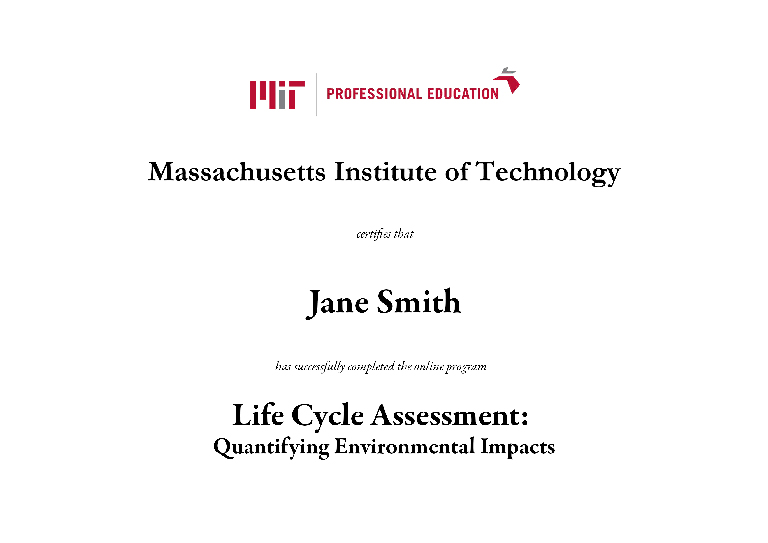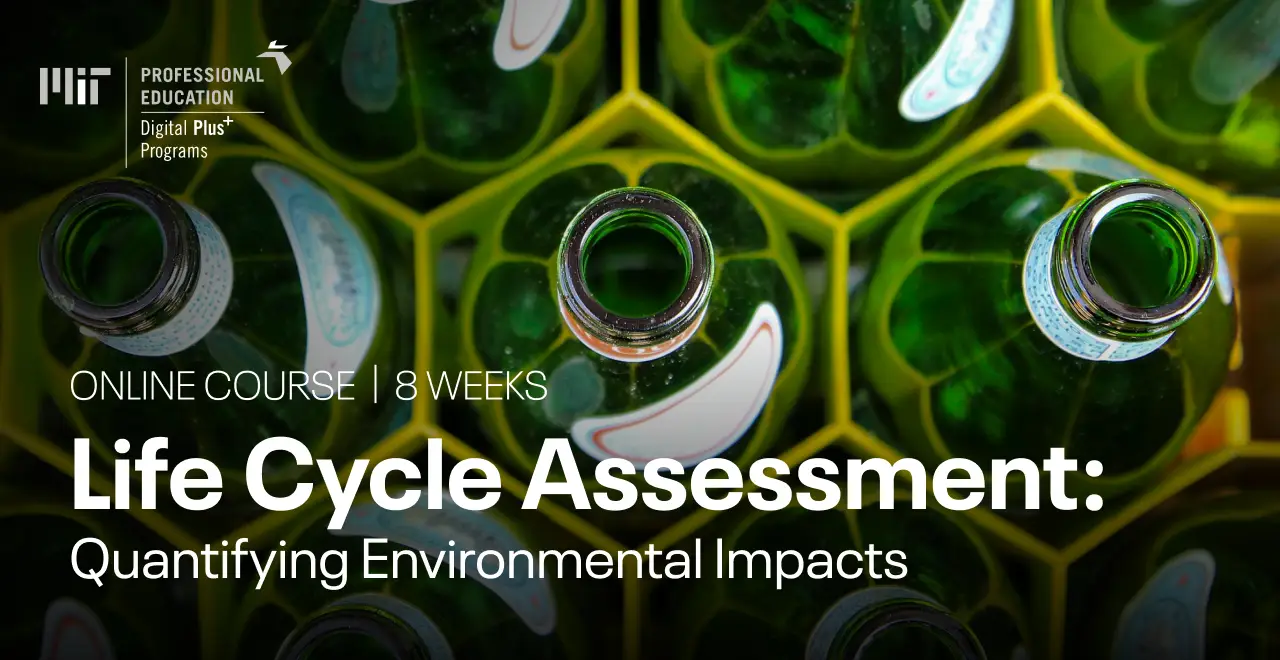This course is part of our Professional Certificate Program in Sustainability and Blended Professional Certificate: Chief Sustainability Officer
The methodology for assessing environmental impacts
Life Cycle Assessment (LCA) measures the impact of products on the environment. At every point during planning, production, and even marketing, the quantity of consumption should be analyzed to adjust business models accordingly. The data collected through LCA helps organizations make conscious decisions that affect the environment.
The Life Cycle Assessment process has become the leading method and central ingredient to sustainable transitions in manufacturing, reducing costs, and improving brand identity. With future policy changes on the horizon for a more sustainable planet, LCA paves the way for organizations to comply with the future of work and to become an environmentally-friendly brand.
In this course, you will help organizations maintain profitability while reducing environmental impact by collecting, measuring, and providing quantifiable data.
2 billion tons
Today, the world produces over 2 billion tons of solid waste yearly, and that amount is expected to grow to 3.4 billion tons by 2050. About one-third of that waste is not managed properly.
Source: The World Bank
8%
The vital LCA analyst role is expected to grow by 8% by 2028 and produce over 7,000 job opportunities across the U.S. The high demand for more sustainable brands could make this projection even larger.
Source: Zippia
60%
We are currently using about 60% more of the earth’s resources than it can regenerate every year; meaning that we are using about 1.6 earths yearly.
Source: World Wide Fund for Nature
An approach to quantifying the environmental impact of a product’s life cycle
The course serves as a starting point for conducting a Life Cycle Analysis (LCA), in accordance with the methods and policies defined by the International Standards Organization (ISO). Information surrounding a product’s life cycle is useful for making decisions about design, policy, acquisition, and corporate strategy.
This course includes the stages of goal and scope definition, inventories and life cycle impact assessments, and interpretation.
You will learn to
1.
DEFINE
the objective and scope of a LCA.
2.
COLLECT
primary data from inventories and secondary data from database.
3.
QUANTIFY
the environmental impacts of products, using various impact assessment methods.
4.
INTERPRET
the results of an LCA through the prism of uncertainty.
5.
SUPPORT
decisions using LCAs and by following ISO 14040 series standards.
6.
MASTER
LCA software and databases, from installation to calculating uncertainty and everything in between.
In addition, you will receive a Certificate of Completion
All the participants who successfully complete the online course Life Cycle Assessment: Quantifying Environmental Impacts will receive an MIT Professional Education Certificate of Completion. Furthermore, participants will receive * MIT Continuing Education Units (CEUs)*.
To obtain CEUs, complete the accreditation confirmation, which is available at the end of the course. CEUs are calculated for each course based on the number of learning hours.
* The Continuing Education Unit (CEU) is defined as 10 contact hours of ongoing learning to indicate the amount of time they have devoted to a non-credit/non-degree professional development program.
To understand whether or not these CEUs may be applied toward professional certification, licensing requirements, or other required training or continuing education hours, please consult your training department or licensing authority directly.

This course is directed towards
- CONSULTANTS
of manufacturing companies who must be aware of current sustainability policies and how to enact them within an organization.
- COMPANIES IN INDUSTRIES
concerned with meeting or setting carbon targets, or hoping to reduce their impact on the environment by following ISO 14040 series standards.
- ACCOUNTING FIRMS
analyzing procedure and process costs of product creation and duration.
- LEGISLATIVE BODIES
implementing policies regarding sustainable manufacturing practices.
* It is highly recommended that functional and cross-functional teams carry out the course together, in order to accelerate the process of adopting smart manufacturing practices.
Meet the instructors of this course
Listed in alphabetical order
DR. JEREMY GREGORY
Executive Director, MIT Climate and Sustainability Consortium

“We have people who have specialized in materials science, engineering and in economics and environment. My specific background is about trying to tie those things together, particularly engineering, economics and environmental issues.”
Learn more
Jeremy Gregory is the Executive Director of the MIT Climate and Sustainability Consortium. He studies the economic and environmental implications of engineering and system design decisions, particularly in materials production and recovery systems.
Research topics include product and firm environmental foot-printing, manufacturing and life-cycle cost analysis, and characterization of sustainable material systems. He has applied these methods, often with industry partners, to a range of products and industries, including pavements, buildings, automobiles, electronics, consumer goods, and waste treatment and recovery. Gregory earned a BS in mechanical engineering from Montana State University, and an MS and PhD in mechanical engineering from MIT.
PROF. ELSA OLIVETTI
Associate Dean of Engineering, Associate Professor of the Department of Materials Science and Engineering at MIT, and Co-Director of MIT Climate and Sustainability Consortium

“An important way to improve the environmental performance of industry is to quantify, treat, and reduce industrial byproducts. This objective could be achieved through industrial symbiosis or byproduct synergy, terms used for beneficial reuse of materials or energy streams from one facility by another.”
Learn more
Elsa Olivetti is the associate director of the MIT Climate and Sustainability Consortium and the Esther and Harold E. Edgerton Associate Professor in MIT’s Department of Materials Science and Engineering at MIT. Her research centers on improving the environmental and economic sustainability of materials in the context of growing global demand.
Her interests span three levels of materials production: operational-level, industrial network-level and market-level strategies. She is focused on two areas with the potential for significant environmental benefits: improving the sustainability of materials through increased use of recycled and renewable materials, recycling-friendly material design, and intelligent waste disposition; and understanding the implications of substitution, dematerialization, and waste mining on materials markets.
Olivetti earned a BS in engineering science from the University of Virginia, and a Ph.D. in materials science and engineering from MIT.



